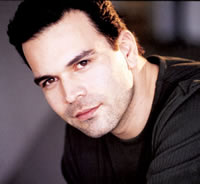

Lights. Camera. Action
 Given the uncertainty of Hollywood, persistence is usually second nature to most actors. Just ask UIW alumnus Ricardo Antonio Chavira.
Given the uncertainty of Hollywood, persistence is usually second nature to most actors. Just ask UIW alumnus Ricardo Antonio Chavira.
Ricardo Chavira’s determination landed him a Saturday audition for an acting part, something virtually unheard of in the cutthroat world of Hollywood. That, in turn, led to a role in the television program “Desperate Housewives,” a show about the lives of five housewives from executive producer Charles Pratt Jr., whose writing credits include “Melrose Place” and “General Hospital.” "Desperate Housewives" is scheduled to air this fall on ABC.
A 1996 graduate of the University of the Incarnate Word, Chavira will play Carlos Solis, a rich, successful businessman married to an ex-runway model on the ABC show and whose character also happens to be a jerk. Told from the point of view of one of the housewives who commits suicide, the show gives viewers an inside look at the secrets that hide behind closed doors. The show, which has been likened to “Sex in the City” and the “Sopranos,” has already received its fair share of praise from the press.
Chavira took an active role in finding this opportunity, for which he was at first overlooked because the directors didn’t think he could be suave enough for the part. After hearing that he wouldn’t be a match for the role, Chavira was determined to prove that he was the right man for the job.
While auditioning for the heads of networks can be nerve wracking, Chavira compares it to auditioning in front of any other audience. “You can’t think of those things because they will affect the outcome of what you’re trying to do,” he said of auditioning in front of studio executives. “You have to go in and do your job, and if they don’t like it, (too bad).”
Chavira’s most recent claim to fame is his portrayal of Gregorio Esparza in the movie “The Alamo,” the world premiere of which was held in San Antonio in the spring. He took Dr. Mary Beth Swofford, a UIW associate professor of English and theatre arts, to the premiere because he considers her his adopted mother. Swofford, according to Chavira, fit right in with the crowd of celebrities and mingled her way through the stars with charm and elegance.
“She was talking to all the guys in the cast and everyone loved her to death,” Chavira said.
Swofford’s relationship with Chavira goes back to his undergraduate years at UIW, when she was one of his theatre professors. Their relationship continued after Chavira’s graduation. Because his own mother died when he was 15, Chavira turned to Swofford as a surrogate mother, and he still calls her every Sunday. “If my mother is looking down in any way, shape or form,” Chavira said, “I know she appreciates that relationship for me.”
Chavira, who is busy enough with his budding career, is also making time for a new stage in his life – fatherhood. Even though his filming schedule sometimes keeps him away from Tomas Antonio Chavira, his seventeen-month-old son, Chavira checks in daily to keep up-to-date on the business of fatherhood. And regardless of where he was on Father’s Day, Chavira spent the day with Tomas and Marcia Dietzel, Tomas’ mother. Tomas and Dietzel currently live in San Antonio, which Chavira plans to make their permanent home.
“I like San Antonio better for my family because I know where everything is, and I’ve known the people there for 20 years or more,” Chavira said.
He adds that San Antonio will remain his hometown because, “It feels good, it smells good and the beer just tastes better!” According to him, everything in Los Angeles – where he has spent the last few years of his life – revolves around the entertainment industry, and everyone caters to it, facts that he doesn’t find attractive as he begins to raise his son.
And even though acting may be in Tomas’ genes, Chavira doesn’t necessarily want him to make acting a career because of the high level of stress involved in the life of an actor.
“I would support my son in anything as long as it’s a good choice and as long as it’s positive. But God, I hope he doesn’t want to go into the entertainment industry,” Chavira said. “Go cut hair, be a doctor, a librarian, outdoors adventurer, pro sports player, but not an actor.”
©2004 University of the Incarnate Word. All rights reserved. Send feedback on this page to Troy Knickerbocker.